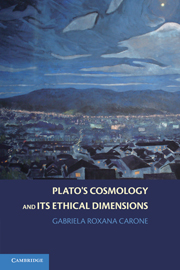Book contents
- Frontmatter
- Contents
- Preface
- Plato's Cosmology and Its Ethical Dimensions
- 1 Introduction
- 2 Demiurgy in the Timaeus
- 3 Cosmic God and Human Reason in the Timaeus
- 4 Creating Mixtures in the Philebus
- 5 Happiness in the Universe of the Philebus
- 6 Reversing the Myth of the Politicus
- 7 Cosmic and Human Drama in the Politicus
- 8 Laws X: First Causes and the Origin of Evil
- 9 Conclusion
- Notes
- Bibliographical References
- Index Locorum
- General Index
2 - Demiurgy in the Timaeus
Published online by Cambridge University Press: 10 May 2010
- Frontmatter
- Contents
- Preface
- Plato's Cosmology and Its Ethical Dimensions
- 1 Introduction
- 2 Demiurgy in the Timaeus
- 3 Cosmic God and Human Reason in the Timaeus
- 4 Creating Mixtures in the Philebus
- 5 Happiness in the Universe of the Philebus
- 6 Reversing the Myth of the Politicus
- 7 Cosmic and Human Drama in the Politicus
- 8 Laws X: First Causes and the Origin of Evil
- 9 Conclusion
- Notes
- Bibliographical References
- Index Locorum
- General Index
Summary
INTRODUCTION
What kind of universe do we live in? How can we coherently explain a world where there is room for both beauty and ugliness, good and evil? In what way do these factors interact, and to what extent do they affect our own lives? The Timaeus will utilise a rich conceptual apparatus, anchored in the notions of intelligent design and recalcitrant necessity, to make sense of these issues, which will occupy us here and in the next chapter.
The leading image the Timaeus employs for this purpose, that of an intelligent craftsman or “demiurge” coping with difficult materials, may raise suspicions about its philosophical meaning, particularly in a work that offers such a difficult medium for the interpreter. Two questions in particular need to be addressed at the outset: First, how much of the Timaeus should be considered mythical, and how much as pertaining to the realm of argumentative discourse? Second, what is the relation, if any, between the various speeches that compose it? Let us start with the latter question.
Notably, Socrates is not the main speaker (that role is allotted to Timaeus, an expert astronomer from southern Italy). Yet the Timaeus starts with an allusion by Socrates to his speech “given yesterday” concerning the best kind of constitution (politeia, 17c), which seems to be reminiscent of the content of the Republic.
- Type
- Chapter
- Information
- Plato's Cosmology and its Ethical Dimensions , pp. 24 - 52Publisher: Cambridge University PressPrint publication year: 2005



